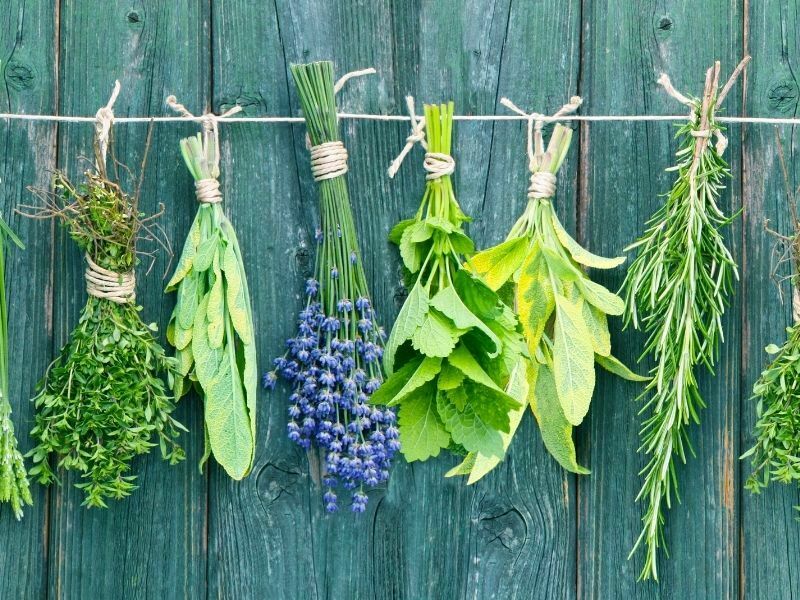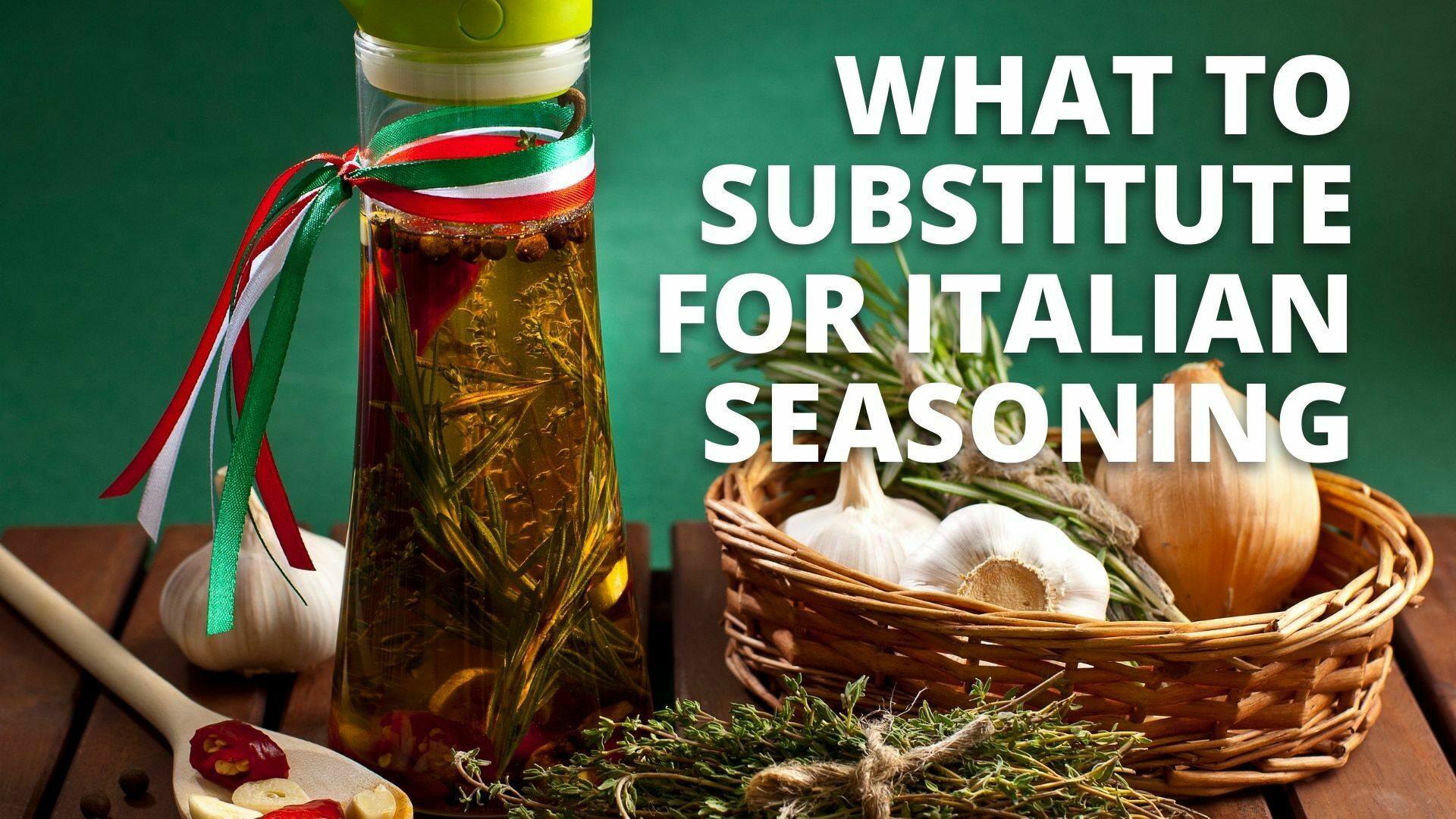If you’re looking for a substitute for Italian seasoning, look no further than your spice cabinet.
Italian seasoning is a blend of dried herbs that gives food a bold flavor. It’s made with basil, oregano, marjoram, rosemary, thyme, and sage. If you don’t keep it in your pantry, you can easily make your own Italian seasoning by mixing together equal amounts of each herb.
But if you’re like me and don’t always keep all six herbs on hand, you can still make something similar with what’s already in your kitchen cabinets! Here are some other herbs and spices that will help elevate your cooking to the next level.
What Is Italian Seasoning?
Italian seasoning is a mixture of herbs that are popular in Italian cuisine. The blend contains basil, oregano, rosemary, sage, and thyme. Some variations may include marjoram, savory, tarragon, and garlic powder. The ingredients are combined into a dry rub for use on meats and vegetables.
The blend can be purchased pre-mixed or made at home by combining equal amounts of dried herbs in a shaker bottle. It can also be used to flavor soups and stews or sprinkled over pasta dishes before serving them to guests at a dinner party so that everyone can enjoy the meal together in one place without having to go out for lunch afterward (which would probably be too expensive anyway).
Italian seasoning is often used as an alternative to salt when cooking meat on the grill because it adds flavor without further dehydrating it from exposure to heat outdoors (this happens with regular salt too but not as much). It’s also excellent sprinkled on popcorn or added to salad dressings
It’s important to note that Italian seasoning doesn’t contain salt or any other seasonings like pepper or cayenne pepper that might be found in other types of seasoning mixes such as taco seasoning or chili powder blends.
Common Herbs in Italian Seasoning
Rosemary
Rosemary is a fragrant herb that grows in clumps with needle-like leaves. Rosemary has a distinctive aroma and flavor that lends itself to poultry, pork, and lamb dishes. It can be used fresh or dried, depending on your preference.
Thyme
Thyme is also a perennial herb that is used to flavor many foods. Thyme is similar to rosemary in appearance, but its leaves are smaller and more delicate. Thyme works well with tomatoes and other vegetables such as eggplant and zucchini. It can be used for chicken, beef, or pork dishes.
Oregano

Oregano is an herb that originated in Greece but has become very popular in Italian cuisine. It has a strong, pungent flavor that goes well with beef dishes and pizza toppings like mushrooms and pepperoni.
Basil
Basil is a popular herb that is known for its ability to enhance the flavor of food. It is also commonly used in Italian cooking. Basil can be used fresh or dried. When using fresh basil, chop it into small pieces and add it to your dish just before serving. Dried basil does not have as strong of a flavor, so you can add more of it to increase the intensity of the taste.
Marjoram
Marjoram is another popular herb that is often used in Italian cuisine. It has an earthy flavor that works well with meat dishes, especially beef, and lamb. Marjoram can be added at any time during the cooking process. Add the herb near the end of cooking so that it retains its flavor without becoming bitter due to overcooking.
Sage
Sage is a beautiful herb that has been used for centuries. It has a very distinct flavor and scent, so it is usually used in small amounts. It works well with tomatoes and other acid-based sauces, but try it with eggs, potatoes, and chicken as well. Sage can be dried or fresh, but either way, it loses its flavor quickly when exposed to air.
Ways to Use Italian Seasoning in Your Cooking
Italian seasoning is a blend of herbs that are commonly used in Italian cooking. It is often used to season meats, fish, and vegetables. The ingredients vary from one recipe to the next depending on what is available locally and personal taste preferences.
Below is a list of some ways that you can use Italian seasoning in your cooking:
Italian Seasoning Recipes
- When cooking pasta dishes like spaghetti or fettuccine Alfredo, add Italian seasoning to the water before boiling the noodles. This will give them an extra flavor boost!
- If you’re making meatballs or meatloaf, add 1 teaspoon of Italian seasoning per pound of meat. You’ll be glad you did!
- Grilled chicken breast tastes great with this added to it while it’s on the grill. Season both sides of each piece of chicken before grilling and enjoy!
- Pizza sauce can be spiced up by adding a tablespoon or two of Italian seasoning to the sauce when it’s about 5 minutes away from being done in the oven. This will give your pizza a new taste!
- Stuffed peppers are always tasty but when you add 1/4 cup of Italian seasoning along with some cheese and onions, they take on a whole new dimension!
The 10 Best Substitutes for Italian Seasoning
1. Herbes de Provence
Herbes de Provence is a mix of sweet and savory herbs that are used to flavor dishes. It typically contains dried thyme, savory, basil, lavender, and rosemary. To make your own, combine equal amounts of dried thyme, oregano, marjoram, and savory in a jar. Seal the jar tightly and shake it to mix the spices. Store the jar in a cool, dry place for up to one year.
2. Herbes de la Garrigue
Herbs de la Garrigue is a French herb blend that usually contains rosemary and lavender along with various other fresh herbs such as parsley or chervil. To make your own Herbes de la Garrigue, combine 1/4 cup fresh thyme leaves; 2 tablespoons each chopped parsley, chervil, and chives; 1 tablespoon minced garlic; 1 teaspoon each chopped rosemary and tarragon; 1 teaspoon dried lavender buds; 2 teaspoons freshly ground black pepper; 1 teaspoon salt; 1/2 teaspoon ground nutmeg; and 1/2 teaspoon ground mace in a bowl. Mix well until all ingredients are evenly distributed throughout the mixture. Store in an airtight container for up to three months at room temperature.
3. Homemade Italian Seasoning
Italian seasoning is a combination of dried herbs and peppers used to season many dishes. It can be made at home or purchased in the spice aisle of your local grocery store. Some people prefer to make their own blend because they want to control what goes into it, while others like the convenience of buying a pre-made blend.
If you want to substitute homemade Italian seasoning for store-bought, use 1 teaspoon each dried basil and oregano, 1/2 teaspoon of dried parsley, and 1/2 teaspoon of garlic powder or onion powder. You can also add 1/2 teaspoon red pepper flakes (or crushed red pepper). This will give you an approximate taste similar to the store-bought variety.
4. Basil and Oregano Substitute
You can use fresh herbs instead of dried ones when cooking Italian food if you have them available. Use 1 tablespoon chopped basil leaves (1/4 cup) instead of 1 teaspoon dried basil leaves; use 2 tablespoons chopped fresh oregano instead of 1 tablespoon dried oregano; use 3 tablespoons chopped fresh parsley instead of 1 tablespoon dried parsley, or use 2 tablespoons finely minced fresh garlic instead of 1/4 teaspoon garlic powder or onion powder.
5. Fresh Herbs

Fresh herbs are probably the best substitute for Italian seasoning because they have all of the same delicious flavors as dried spices without requiring any cooking time beforehand. If you have fresh oregano, basil, or thyme at home, use those instead of dried versions in any recipe that calls for Italian seasoning. Just remember that fresh herbs will only work well when added at the end of cooking time since they lose some of their flavors when cooked too long.
6. Pizza Seasoning
If you want something similar to Italian spice but without all of the herbs and spices, try using pizza seasoning instead! This blend typically includes salt, garlic powder, and onion powder, so you’ll end up with a lot of the same flavors you would find in Italian seasoning. The only difference is that it’s not quite as spicy as most Italian spices.
7. Greek Seasoning
Greek seasoning uses oregano, marjoram, thyme, and rosemary as its main ingredients. It also includes parsley flakes, garlic powder, onion powder, and basil leaves. You can find this blend at your local grocery store or online at Amazon.com or iHerb.com.
8. Creole Seasoning
Creole seasoning is another spice blend that contains paprika, thyme, and oregano among other herbs and spices. You can use it just like you would use Italian seasoning in any recipe that calls for it; however, it doesn’t have any pepper, so you may want to add some black pepper if your recipe calls for that spice.
9. Italian Dressing Mix
In place of Italian seasoning, you can use dried parsley and oregano. To make a dressing, simply add two tablespoons of the mixture to two tablespoons of olive oil. Add one teaspoon of vinegar or lemon juice and salt and pepper to taste. Mix well and pour over your favorite salad greens.
10. Za’atar
If you like za’atar seasoning, combine one tablespoon each of dried thyme, oregano, and marjoram with two teaspoons of sesame seeds, two teaspoons of sumac powder, one teaspoon of ground cumin, and one teaspoon of salt.
Conclusion
Italian seasoning is a blend of herbs and spices that is used to flavor Italian dishes. It can be made with dried basil, oregano, marjoram, rosemary, sage, and thyme.
One way you can substitute for Italian seasoning is by using other herbs and spices in your pantry. For example, you could use a bit of garlic powder or onion powder instead of fresh garlic or onion.
Another way you can substitute for Italian seasoning is by using an Italian seasoning blend from your local grocery store.

